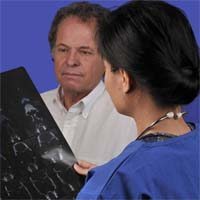Inhibitor May Reduce Mesothelioma Fluid and Prolong Survival

A drug based on a naturally-occurring cell growth inhibitor may boost the effectiveness of chemotherapy against mesothelioma fluid buildup.
The drug, called Endostar, is based on endostatin, a compound derived from human collagen. In the body, endostatin acts as an anti-angiogenic agent, preventing the kind of vascular development that cancer cells need to grow and thrive. By effectively choking off the natural formation of tumor-feeding blood vessels, Endostar aims to ‘starve’ mesothelioma cells and shrink tumors.
In an article detailing a recent Endostar case study, researchers in China report on its ability to relieve one of the most life-limiting symptoms of mesothelioma – excessive fluid buildup. As mesothelioma cells spread across internal membranes, such as the pleura (around the lungs) or peritoneum (lining the abdomen), they can trigger the body to produce excess fluid. As fluid builds up in the pleural and peritoneal cavities, mesothelioma patients may experience pain and discomfort and be unable to draw a deep breath.
To determine whether Endostar’s anti-angiogenic properties would have any effect on pleural and ascetic fluid, the Chinese team administered the drug in combination with a mesothelioma patient’s chemotherapy regimen. The test subject was a 43-year-old man with advanced malignant pleural mesothelioma. Writing in the Italian-based Journal of Chemotherapy, the research team described the patient’s response this way – “The addition of Endostar to the gemcitabine-cisplatin regimen gave a prompt and significant improvement of clinical symptoms and disappearance of ascites.”
But the news gets even better. Although many mesothelioma patients do not live beyond a year after diagnosis, the patient on the Endostar/chemotherapy combination was still progression-free after 27 months. The results prompted the Chinese researchers to recommend that Endostar be further explored in combination with chemotherapy for mesothelioma, “especially its effect on pleural and ascitic fluid”.
Endostatin was first studied in the U.S. by Boston cancer surgeon Dr. Judah Folkman. Currently, Endostar is only licensed for used in China, where it was approved by the State Food and Drug Administration for the treatment of mesothelioma and other cancers in 2005. According to Cancer Therapy China, the makers of Endostar have engaged in talks with U.S. pharmaceutical firms but no deal has yet been arranged for U.S. distribution.
Sources:
Endostar – Antiangiogenesis Therapy, Cancer Therapy China website.





